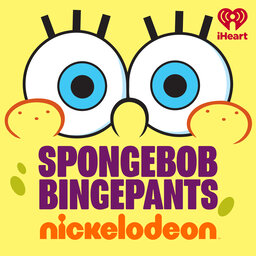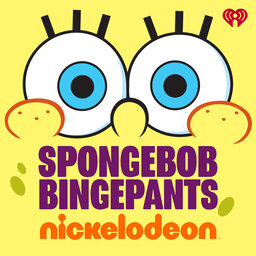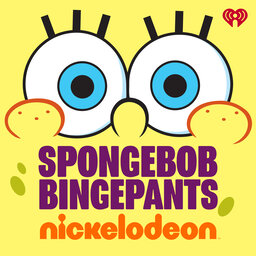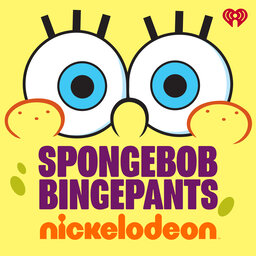Derek Drymon: From SpongeBoy To SpongeBob (Pt 1)
Like Hector always says, SpongeBob was born from the perfect combination of the right people in the right place at the right time. Few people embody this more than Derek Drymon: the perfect creative partner to creator Stephen Hillenburg. Derek indulges our hosts in the history of SpongeBob, from his amorphous origins to the loveable square we know him as today.
Here we see Bikini Buckham teaming with life home of one of my favorite preaches, SpongeBob square Pants. Yes, of course he lives in a pineapp and U Si Lee. You started showing me a little drawings, little doodles, and I remember when he showed me that square, the square SpongeBob for the first time. You know, he kind of he was working on like an amorphous SPONGEO originally was just like kind of a more realistic amorphous sponge and at some point of clickton so he drew the square and he showed it to me, and I was like, oh, yeah, that's that's that's it. That's that's really good, you know. Welcome to SpongeBob binge Pants, Nickelodeon's official podcast about all things SpongeBob. I'm Hector Navarro and I'm Frankie grand Bang. We're back with an amazing interview today. Really one of the most important figures in SpongeBob history. We are talking to Mr Derek Dryman today. Derek was in development for the show itself in the very beginning, working on creating these characters, creating the stories, worked on the first three seasons, the first movie, and in that became a supervising director and producer on the show. Just an awesome, awesome guy. This man was in the room where it happens for everything. So we get all of this amazing information in this interview today as well as we touch on some of his most recent work, so we're gonna get into that as well. So it's a wonderful interview and I'm really excited. Actor shall shall we get into it? Let's do it, hope you guys enjoy. I want to talk about Hotel Transylvania Transfermania. You co directed the movie with Jennifer Kluska. What I would love to know is what was the most rewarding part of that experience, Derek, Hotel T was my first, you know, directing job on a full feature. I've been working in features for a bunch of years, and I've directed shorts commercially, you know, I was doing commercials for a little while and you know, and then a lot of TV stuff. So the feature was rewarding just to finish it. It was rewarding to get through it. Those these are are so big, the level of quality of the animation and the team that Sony has, some of the best people in the world that are working there, So just working with that level of skill, it's just inspiring. It would push me to be better, do better, maybe, you know, try to direct better. It's it's it's hard when you have these people that are they're the best in the world and they're looking to you, Okay, what are we gonna do now? And uh, it's it's like, I hope I don't want to send them down the wrong road. You know, coming from the world of TV animation, you're very familiar with what it takes to make a cartoon for television and the budgets and those constraints that you get. Was that something that like knowing that and then you come to the feature world, were you ever surprised where you're like, man, if only we could do this, and someone's like, we can do that, You're like, oh, whoa, what really? I mean? Was that kind of a bit of a change for you going into the world of features. Well, when I worked in illumination for a couple of years, and that's how illumination was. You know, you could get almost any song you wanted, you could get again, some of the greatest animators in the world. Where we're doing it, so there was always a deadline, but if you need a little more time, you could get it most of the time. So that was that was kind of an unshackling. It's like, wow, you can almost do anything you can think of, which could lead you down a rabbit hole of all of a sudden, you know, you're kind of second guessing yourself constantly. But so that was exciting because because there was that was only limited by your imagination, the way you could come up with or what, you know what. Everybody liked that kind of thing. Hotel t was a little different because the schedule was really compressed. They wanted to get it out quick, so there were a lot of limitations on it. And so actually the TV experience and Jen had TV experience too, and you know, of course Gendy has TV experience, so you know, we all kind of came out of television and so we knew how to make the best out of what you have and sometimes great things come out of that too. It's you know, you gotta make decisions fast and then stick to him and drive it all the way through the whole process. So so it's a give and taken and it is exciting to have all the money in the world to make these things, but then it's not always the best because, like I said, I've seen some movies where where people just spin and they keep coming up with different Oh, we can make it better, we can make it better. And in this attempt to make something great, they forget how to make something just good and how to tell a story well. And eventually you do run out of time and money and then it's like pencils down and you and then sometimes you're left with this isn't so hot. But that didn't happen because that Hotel Tea was nice because we just hit the ground running. Gendy wrote, you know, wrote a script. We made the script as he was writing it, you know, and then we would kind of tweak it as we went, and there wasn't really any time to kind of rethink, you know. Yeah, I love that to your point, though, like if the shark had worked in Jaws, Steven Spielberg's movie would have been different, it would not have been as good. But the fact that that that the robot shark didn't work, he had to pivot and it was then the most successful suspensible movie of all times. So that's a great example Yeah, that that's you know, television is a great example that like television animation, right, it's super limited compared to feature but you can make things that stick around and hit people years after you make them. And then you can have all the money in the world and make a movie and and it uh and it kind of fizzles and the people forgot about. Like a SpongeBob was always like trying to find what kids relate to. It's always kids stories. It's kind of what are they going through in their life. You can make a story about that. Every kid is going through that, and then every adult has gone through that, so they can remember what it was like, you know, the embarrassments and things like that. Oops, I guess I read my dad's again again, dude, you have split my sides. Interesting detail for Hotel T is the editor from Hotel T was the editor from the SpongeBob show. Linn Hobson. She was on all the you know, all the TV show and then she did the first movie with us. So you really had an all star crew of TV animation veterans like you. You really did, like everybody had that. Yeah, that's great. Yeah, to kind of veteran television guys worked on almost the whole show for us and did some of the ore, a lot of our boarding, and again sometimes they would get a little too uh, theatrical with their boarding, and Jen and I would have to, okay, tone it down. Remember TV. Think about television, like, how if you had to do this for TV? How would you do it? And then it kind of changes the way you have to think and stage. And but you know, feature storyboard artist who had never worked in television, they don't They might not understand that language, or they might think, oh, this is cheap and easy. You still got to be creative. You still have to entertain people, but doing it in a way that works on television is a different. Yeah, it's all about clarity. It's all about, you know, being able to tell that story in a clear and concise and simple way, and sometimes that is more difficulty. You know, you're the first Sacredit to ever visit. I can'd imagine. Why can I get you anything? What would be nice? I'm gonna put these in a vase, take your die. You met a bunch of awesome folks on Rocco's Modern Life, and eventually that would coalescen to the SpongeBob team. But even before SpongeBob, I have to mention this, Derek, you worked on Hey Arnold Cat Dog, the Action League Now stuff for Blam, which was so much fun. Just kind of tell us briefly, what was it like to be at Nickelodeon at that magical time in cartoon history and everybody doing all these these great shows and this great stuff. It's funny to say it's magical. It was my first job. We were all in our twenties because it was a non union shop, and so they couldn't get the really experienced big leaguers because they were all at Disney or Warners of those different places. So they would usually hire one or two very experienced people right and then and then they would hire a bunch of kids right off the street. You know. Steve was a experimental animation major, like he wasn't even a character anima or like Nickelodeon was pretty young and there weren't a lot of rules yet someone like me could just hop around and hey, I'm a writer, and then they would let you write, you know, and I'm an artist too, and then they would let you draw. It was it was, they kind of just needed people to do stuff. And if you went up and said, oh, that's what I do, uh, then you know they would at least give you a chance. Today's the big day, Gary, Look at me. I'm gott to be in top physical condition for today. Gary. And it feels like with every person we talked to Derek talking about that era, that everyone's very humble and they're like, we just we're just a bunch of kids. We're just doing whatever. But Frankie and I, because we're these adults who get to like analyze it, we're going They had the exact right style of outsiders and people who had heart and people who like you were saying, Derek like kind of outside the box typically to what animation in television was happening at the time, that all of these folks and everything that they were bringing to the table would lead to these great, unique Nickelodeon shows you touched on. You know, I really believe what makes a show. What makes a show where the people working on it, and you know if you you change up the crew, you're going to get a different results. That's that's true movies, that's true in TV. Um there's a certain flavor that is in the crew that you know, if you've if you worked on it, you can see it when you watch the movie or the show or the TV show. So yeah, for sure, it's the it's the personalities involved, which is you know, it's nice, it's it's that's kind of the artist hand. You know that you're sensing. Yeah, and that's what made SpongeBob so unbelievably special. They were just the perfect people in the perfect place at the perfect time, and you were there. So we would love to talk to you a little bit about like how did you get involved and when did you learn about this show? So I started working with Steve on Rocco. He was he had become the crib director when I the same season that I jumped up and became a storyboard artist. My partner was Mark O'Hare. Mark was Steve's storyboard artist. So Steve and Mark already had a connection. You know. I came in. I just had ton of energy and I just saw, let's make cartoons. And uh, you know, Mark really had to like, all right, slow down and take it easy. You know. He was very methodical, um and and just kind of would big would think and think and think about things, and I would present all these ideas and he would think and think and redo. Steve is exactly that way too. He was. He was very methodical, very kind of slow moving. You know, you could present him with a bunch of ideas. He wouldn't say yes or no right away. He would think about him. You know. He had this idea to do his show. He approached Robert Skull, who was a close friend to his, who was another storyboard director. But Robert was finishing Rocko and he was gonna, I think he was gonna get on a boat and he was going to sail the world. And he was like he needed a big break. He was done, he was unavailable. And then um Steve also asked Mark if he was interested in uh in working with him on this idea. And Mark had just sold a comic strip called Citizen Dog to Universal Press, so he that was kind of his big dream was to do comic strips. So he was kind of going off in that direction. And so I was in the room when Steve brought it up and Mark, you know, Mark's really go to say no, you know, He's like, you know, I can't do it. I'm too busy doing this other thing. And so he left and then I was sitting there for me. I was so happy to be drawing storyboards, and I knew Rocco was ending, you know. I said the market point, well I would do that, and he's like, well, go ask him. So I followed him out. I ran after him into the hallway, uh A quot him in like there was atrium, and I'm like, hey, I would do it if you need somebody, you know, if you can't find anybody to keep me in mind. And so so then months later, months went by and Steve was upstairs finishing up Rocko and I was downstairs on Arnold and I just walked by and we're always talking, say hi, and he started showing me a little drawings, little doodles, and I remember when he showed me that square, the square SpongeBob for the first time. You know, he kind of he was working on like an a morphous spongeob originally was just like kind of a more realistic amorphous sponge, and at some point it clicked and so he drew the square and he showed it to me, and I was like, oh, yeah, that's that's that's it. That's that's really good. Um. I mean I think he decided on it, but it was the first time I saw it, and it was one of those moments of you know when you see something for the first time that you like, it's something that totally makes sense, but no one had ever really done it before. Um yeah, and it was like kind of that moment of like, oh, that's a really genius idea. He eventually, you know, approached me about it, and so he hired me to work with him as he would develop the show. And his original idea was, let's do a storyboard, you know, let's write a let's write an episode, And so I'd go over to his house a couple of days a week after work and we would just kind of try to write an episode. And then that quickly evolved into we don't really know enough about the character yet or the world to actually write an episode. So it eventually just became times we just get together and just talk about the characters, you know. You also, you know, had Nick Jennings working on backgrounds, painting style and you know, trying to interpret Steve's painting style into a show. And then Tim Hill was also helping Steve organize it, and he would kind of bring up these hard questions about just from a writer's point of view, you know, And so it maybe took like a nine months or something Steve kind of working through until he got the Bible together and then he pitched it there. It is the finest eating establishment ever established for reading the crusty crab hole of the crampy Patty with a help wanted sign in the window. For years, I've been dreaming of this moment. I'm going to go in there, march straight to the manager, looking straight in the eye the line, and I can do this with with It's so cool when you do again, just to hear you very humbly, because if we built this up, it's this big legendary thing and this piece of cartoon history that you guys were there for, and you're just like, I just walked by, said what's up? So I love it. Do you remember anything that you guys came up with that didn't make it into kind of like a character or a story idea that you think it's kind of crazy to think that we even mentioned that all these years later, Like, can you recall anything that sort of fell on the cutting room floor, as it were, That's know, somebody or you throughout any kind of juicy you know, little what ifs that we don't know about. Remember when he first showed me Patrick, I forget what his name was, but he had a starfish and he was pink, and he was really angry thinking. And the idea was that that he would be this like angry character who was really mad about being pink. And he was like this macho guy, but he hated the fact that you know, people didn't think he would. You know, he just had this chip on his shoulder because he was pink. And that was about a a day because he showed that to me, and uh, that's really what what happened was that Steve would spend time working on things, and that he would show we would talk about it, and then I would just throw his back and just talk about it, maybe do it a little bit, and then I would leave and then he would stew on it, and then the next time he would have made some choices based on what we talked about. Um, and that that process of how we worked, that's that's kind of how it worked all the way through. Was that I would give Steve a couple of ideas and then I would go take a walk and by the time I got back to the conference room, gave him time to think and be on his own for a minute, and then he was like, Okay, so what we're gonna doing. I forget what I said about the Polly Patrick version, and uh when I came back the next time, he was like, Oh no, no no, it's gonna be I think he's going to be the friend the dumb guy. It was way closer to the Patrick you know. So that was that was definitely one one version. Yeah, what kind of boyisters? This is the watering try to tell you you're doing this? We got the show is picked up, and you sit down and you start making help wanted. I mean, as you're doing this and you're creating this, did you have a sense that this was going to be like a big hit or we're just kind of having fun like you've been doing up until this point. Well, I mean, I I was coming off a rocko and and just really being in love with the process of storyboarding, in storyboard writing when we finally got to do you know, and then I was on Hey Arnold for a long time, and then I was on Cattog during this period, so I got to do it a little bit. But when we got to finally do help wanted. I was just really excited to do it. And Steve was such a funny guy. He was he was such a good joke writer. And you work with people that are really good, really better than you, it it kind of forces you to I gotta really get my A game on. So it was definitely timidating, but um but super fun. I was very proud of it, and I just thought people are gonna love this thing, you know, but again you don't know. I mean, they're like, there are definitely people that did not love it. Remember when we showed the finished pilot to the conference room full of pople. It was like a couple of shows worth. The people were just all piled into this conference conference room while watching it, and it definitely got laughs. But it was not like people weren't like stripping the clothes off, like it's the greatest thing ever. It was just kind of like like, remember one guy went to me, He's like, yeah, it was it was cute. I goes, I don't know where you're gonna go with it. It's like he got the job he was. But you know, I was, I loved it. I was. I was really proud of it, and and uh, and I thought it was it was exactly what I wanted to do. I think that's really funny, like I don't know where you're gonna go with it. And then twenty years later, yeah, exactly. I've seen him since and he was like, Hey, I was wrong. That's great, that's awesome. Hector. I think we have to stop the interview here because there's too much information. There's too much good tea that is still yet to be spilled, and so much we're excited to announce. This is a two part of Everybody, So make sure you come back and next week to hear the rest of our amazing interview where Derek Dryman about all things SpongeBob and all the origin stories about where he was when it happened. Amazing, amazing interview to come, so make sure you check that out next week. Thanks for listening. We'll see you guys in a week for part two. Bye
 SpongeBob BingePants
SpongeBob BingePants


